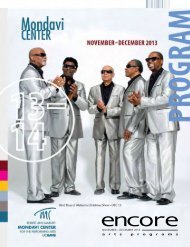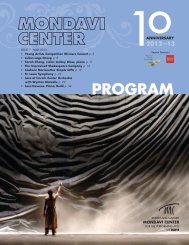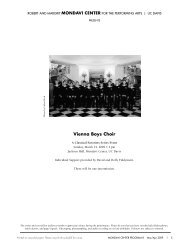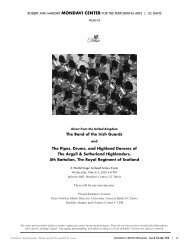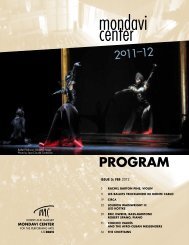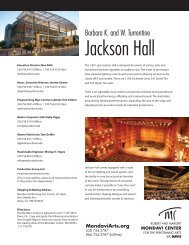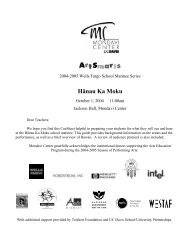Create successful ePaper yourself
Turn your PDF publications into a flip-book with our unique Google optimized e-Paper software.
jojga hip hop foundation samples poems, wishes and curses<br />
in a mix with literary Javanese texts and colloquial riffs.Their musical<br />
hooks are pinned to global rhythms, traditional gamelan music<br />
and a love of language. Their songs speak out about corruption,<br />
shout for social justice and have been taken up as anthems in public<br />
demonstrations and rallies.<br />
Recognized as one of Southeast Asia’s foremost collectives, JHF<br />
was established to promote diversity and pluralism. After few small<br />
projects, JHF started the Indonesian poetries project in 2006 then<br />
produced the albums Poetry Battle 1 (2007) and Poetry Battle 2<br />
(2008). Both incorporate poetry and oral literature dating from the<br />
18th century and contemporary poetry they reinterpret for a new<br />
audience, reinvigorating an interest in the country’s rich past. In<br />
other instances JHF has successfully merged these ancient texts with<br />
Islamic teachings to exemplify the spirit of syncretism and plurality.<br />
On a national scale, the group has experimented with other<br />
Indonesian languages to create songs about anti-corruption. JHF<br />
engages various socio-political and cultural issues while aesthetically<br />
continuing to ground their work in popular and historical Javanese<br />
sources. They expand the Javanese-ness of their hip-hop in ways<br />
beyond their lyrics. Their hip-hop sounds are extremely hybrid.<br />
Founded by Marzuki Mohammad aka Kill the DJ in 2003, JHF is an<br />
umbrella for Yogyakarta-based hip-hop crews that mostly use traditional<br />
Javanese language. Even though the name might sound formal,<br />
JHF operates in a more communal way rather than as a formal<br />
institution. JHF is best known for three crews: Jahanam, Rotra and<br />
Kill the DJ; a bunch of Javanese rude boys standing still in the crossculture.<br />
Talking about yogyakarta<br />
It is almost impossible to leave Yogyakarta out of a discussion of<br />
Indonesian culture. It is a small province, the smallest among the<br />
four other provinces in Java, yet its pivotal role is enormous. It is the<br />
place where almost all signifiers of Javanese cultural production—<br />
such as gamelan, wayang kulit (shadow puppetry), wayang orang,<br />
court dance, oral literature, etc.—were developed for centuries, long<br />
before the dawn of the colonial age. And they eventually took part in<br />
shaping the national Indonesia as a modern idea.<br />
At the same time, Yogyakarta is not an enclosed and sterile space.<br />
Its glorified history is also strengthened by its post-independence<br />
function, which was to serve as the city of education. For decades,<br />
Yogyakarta has built a strong foundation for the growth of educational<br />
institutions, making it one of the most dynamic and youthful<br />
urban cities in Indonesia.<br />
—Ugoran Prasad<br />
An artist and independent researcher, Ugoran Prasad is a playwright and<br />
dramaturg in residence with Teater Garasi Yogyakarta as well as program<br />
manager at the Indonesian Society for the Performing Arts. He is a performing<br />
lyricist of Melancholic Bitch, a Yogyakarta-based shadow pop band.<br />
He was also featured in the first JHF Poetry Battle album. He was a visiting<br />
scholar at the Performance Studies Department at New York University and<br />
a fellow of the Asian Cultural Council in 2011.<br />
center stage<br />
Diplomacy doesn’t just happen in conference rooms or at embassies.<br />
It can burst out in classrooms and studios, on town greens and<br />
beside historic landmarks, in coffee shops and arts centers,<br />
moving from person to person, between artist and arts lover. From<br />
June–December 2012, 10 different contemporary performing<br />
arts ensembles from Haiti, Indonesia and Pakistan are making<br />
independent month-long tours in the U.S. as part of <strong>Center</strong> Stage.<br />
Residencies include performances, workshops, discussions, peopleto-people<br />
exchanges and community gatherings. This public-private<br />
partnership is the largest public diplomacy effort to bring foreign<br />
artists to American stages in recent history.<br />
Keep up with <strong>Center</strong> Stage and find additional information about<br />
Papermoon Puppet Theatre at www.<strong>Center</strong>StageUS.org, on Facebook<br />
(www.facebook.com/<strong>Center</strong>StagePage) and Twitter (@centerstage).<br />
Special thanks to Rachel Cooper and Asia Society.<br />
question & answer Session moderators:<br />
Henry Spiller, chair, Department of Music, UC Davis, is an<br />
ethnomusicologist whose research focuses on Sundanese music<br />
and dance from West Java, Indonesia.<br />
Katherine In-Young Lee, assistant professor, Ethnomusicology,<br />
joined the UC Davis Department of Music faculty in July 2012.<br />
Sarah Geller is a Ph.D. candidate in Ethnomusicology. She<br />
teaches African American Music at UC Davis and is currently<br />
writing her dissertation on hip-hop in America.<br />
Indulge<br />
Fine iTALiAn CUiSine<br />
2657 PorTAge BAy<br />
eAST, DAviS CA 95616<br />
(530) 758-1324<br />
oSTeriAFASULo.Com<br />
Free PArKing<br />
FASTeST & eASieST WAy<br />
To THe monDAvi CenTer<br />
<strong>Mondavi</strong>Arts.org | 49



